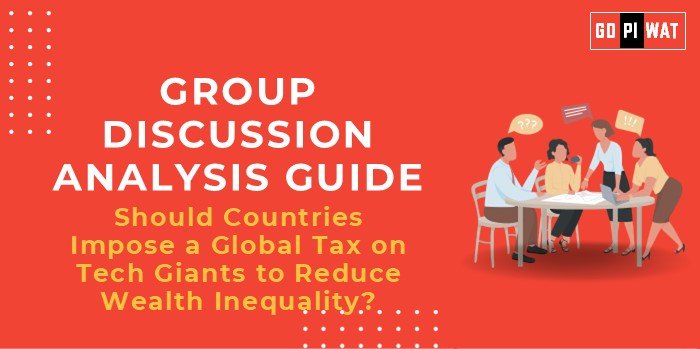📋 Group Discussion (GD) Analysis Guide
🌐 Topic: Should Countries Impose a Global Tax on Tech Giants to Reduce Wealth Inequality?
📖 Introduction to the Topic
With tech giants such as Amazon, Apple, and Google accumulating unprecedented wealth and market power, the concept of imposing a global tax has sparked debates about addressing wealth inequality and ensuring fair contributions to economies.
The Organisation for Economic Co-operation and Development (OECD) proposed a global minimum corporate tax rate of 15% in 2021. However, its implementation remains complex and contentious as countries balance attracting investment and addressing inequality.
📊 Quick Facts and Key Statistics
- 💼 Tech Giants’ Wealth: The top five tech firms (Apple, Microsoft, Alphabet, Amazon, Meta) have a combined market capitalization of over $9 trillion (2023, Bloomberg).
- ⚖️ Wealth Inequality: The top 1% of global wealth holders own 45.6% of total wealth, compared to 0.8% for the bottom 50% (Credit Suisse, 2023).
- 📉 Tax Avoidance: Multinational corporations shift an estimated $600 billion annually to tax havens (Tax Justice Network, 2022).
- 🌐 OECD Proposal: 136 countries signed a global tax deal to ensure a 15% minimum tax rate (OECD, 2021).
🧑🤝🧑 Stakeholders and Their Roles
- Governments: Advocate for tax fairness to reduce inequality while balancing investment incentives.
- Tech Corporations: Argue for maintaining low tax obligations to sustain innovation and expansion.
- International Organizations: Facilitate tax agreements and frameworks (e.g., OECD, G20).
- Civil Society: Push for transparency and equitable wealth distribution.
✅ Achievements and Challenges
🌟 Achievements
- Tax Reforms: OECD’s global tax deal lays groundwork for harmonized international taxation.
- Revenue Redistribution: Potential to generate $150 billion in additional global tax revenue annually.
- Wealth Inequality Focus: Brings global attention to disparities created by tech giants’ low tax contributions.
⚠️ Challenges
- Implementation Complexity: Harmonizing tax laws across diverse economies.
- Avoidance Strategies: Tech firms employ loopholes and profit-shifting mechanisms.
- Geopolitical Resistance: Tax havens and some nations resist changes to attract foreign investment.
🌍 Global Comparisons and Case Studies
- France: Digital services tax on tech companies introduced in 2019, sparking debates with the U.S.
- Ireland: Attracted tech giants with a 12.5% corporate tax rate, now under pressure to align with global norms.
Case Study: Google’s Tax Settlement – In 2020, Google paid a €500 million settlement to France over tax disputes, highlighting the challenges of enforcing fair taxation.
📚 Structured Arguments for Discussion
- Supporting Stance: “A global tax on tech giants ensures fair wealth distribution and curbs the increasing global inequality.”
- Opposing Stance: “Such taxation stifles innovation and creates barriers to economic growth in emerging markets.”
- Balanced Perspective: “While a global tax promotes equity, its success depends on harmonized implementation and innovation safeguards.”
💡 Effective Discussion Approaches
- Opening Techniques: Start with a statistic on wealth inequality or highlight a global tax success story like France’s approach.
- Counter-Argument Handling: Use examples like the OECD deal to showcase feasibility while addressing concerns about innovation.
📈 SWOT Analysis
- Strengths: Equity promotion, additional revenue, international cooperation.
- Weaknesses: Implementation challenges, risk of corporate pushback.
- Opportunities: Encourage sustainable development, bolster public infrastructure.
- Threats: Geopolitical conflicts, risk of tax evasion.
🎓 Connecting with B-School Applications
- Real-World Applications: Research themes in global finance, tax policy, and economic inequality.
- Sample Interview Questions:
- “How does a global tax address the challenges of wealth inequality?”
- “What role do international organizations play in enforcing global taxation?”
- Insights for Students: Explore policy-making challenges and the role of tech giants in shaping economic landscapes.


